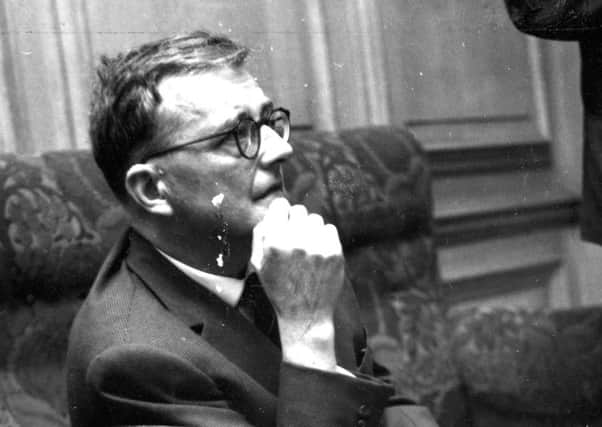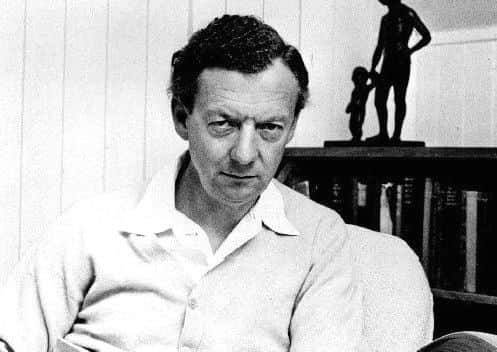International Festival: When Shostakovich pulled aside the Iron Curtain


As a child of post-Second World War optimism, and of a world frantically realigning itself according to conflicting ideologies, it was inevitable that the early years of the Edinburgh International Festival should have inspired moments where art ruptured the Iron Curtain. It happened in 1962, the year Festival director Lord Harewood played the anti-Cold War card by inviting Dmitri Shostakovich to an International Festival music programme dominated by a cross-section of the great Russian composer’s symphonies and chamber works, some of which were being heard in the West for the first time.
The 1962 International Festival also promised to bring together two of the most intriguing modern composers of the day. By inviting Benjamin Britten to perform (accompanying the great Mstislav Rostropovich in Shostakovich’s Cello Sonata), and to see a production of his own opera The Turn of the Screw, Harewood created an opportunity to rekindle a nascent friendship that had taken root at the 1960 London premiere of Shostakovich’s First Cello Concerto.
Advertisement
Hide AdAdvertisement
Hide AdThe London programme had also featured Britten’s Cello Sonata, dedicated to Shostakovich. Each admired the other greatly, but spoke only briefly. Harewood’s rematch in Edinburgh should have presented an opportunity for them to become further acquainted, but fate played its hand – a seriously frozen shoulder prevented Britten from performing, so he headed home at the earliest opportunity.


“My meeting [in Edinburgh] with Benjamin Britten was rather short unfortunately,” recounted Shostakovich in a subsequent radio address to the USSR Composers’ Union. “He is suffering from some disease which affected his left hand, which he has to keep strapped up. It’s a kind of nervous disease, something very serious. And he wants so awfully much to come to our country. I’d like to say that, in my opinion, he is one of the most talented composers abroad.” In later years, Shostakovich dedicated his Fourteenth Symphony to Britten.
In personal terms, they shared similar characteristics. Both were shy and reticent. Musically, a mutual admiration for Mahler gave commonality to their early compositional aspirations. In Shostakovich’s case, this manifested itself most openly in the extravagance – he referred to it as “grandiosomania” – of his heavily scored Fourth Symphony.
That work, coupled with Britten’s Variations on a Theme of Frank Bridge and Prokofiev’s Classical Symphony, that lies at the centre of one of this year’s Festival extravaganzas. It will use the combined forces of the Mariinsky Theatre Orchestra and Royal Scottish National Orchestra under the baton of International Festival honorary president Valery Gergiev.
Festival director Fergus Linehan reckons the Shostakovich legacy is worth shouting about. When he approached Gergiev about putting the two orchestras together, the maestro loved the idea. “He’s one of those conductors you’d describe as a true festival conductor, who wants to think of other ways of presenting music, something that would have real substance and a legacy behind it,” says Linehan.


Think of the extraordinary significance of the 1962 performance by Gennadi Rozhdestvensky and the Philharmonia, the UK premiere of a work written in the 1930s, withdrawn by the composer during rehearsals for its originally intended Leningrad premiere due to growing criticism of his music by the Soviet regime, and only finally unveiled to Russian audiences in 1961. By then it was seen as the “missing link” in Shostakovich’s symphonic output, which had by then reached No 12.
The Edinburgh performance was a truly symbolic moment for Western audiences keen to understand the musical ethos of Soviet Russia, for at the time of writing the Fourth Symphony, Shostakovich had been seriously under threat from Communist Party attacks. Immediately after Stalin attended a 1936 performance of his popularly-acclaimed expressionist opera Lady Macbeth of Mtsensk, an article in the state newspaper Pravda denounced the composer as subversive and in opposition to the cultural values of the Communist Party.
Advertisement
Hide AdAdvertisement
Hide AdFrom that point on, or at least until Stalin’s death in 1953 and the affirmative Tenth Symphony, Shostakovich’s music adopted an enigmatic ambivalence which has fascinated and divided commentators ever since. Did he become a puppet of the State, or should the often biting, bittersweet acerbity be viewed as satirical comment on his political masters?
The Fourth Symphony’s presence in this year’s 70th Anniversary International Festival is very much part of a wider Shostakovich tribute that will include other works of his which featured in the 1962 programme: a performance of the Symphony No 12 by the Filarmonica della Scala under Riccardo Chailly (the 1962 performance, again by the Philharmonia, was also a Western premiere), and Lady Macbeth of Mtsensk District Suite, which features in a Festival Finale by the BBC Scottish Symphony Orchestra under Martyn Brabbins.
Gergiev, when questioned about the Fourth Symphony during Shostakovich’s centenary in 2006, considers it to be a “reservoir”, written at “the lowest ebb of the composer’s life, into which he put everything he wanted to express.” When it was finally performed 25 years later, audiences, including those in Edinburgh, were shocked by its grotesquerie and violence.
“After Lady Macbeth, maybe he told himself ‘enough is enough’,” Gergiev argued. “If you use words, people can ask why you’re using this one and not the other. If you use music, you are much more mysterious. And if people say: ‘But I can sense this music is against Stalin’, you can say, ‘No, it’s about the greatness of our country.”
Even by 1962, under Khrushchev’s liberalisation of the arts, Shostakovich still had to watch what he said. When asked by a local Edinburgh journalist at a Festival press conference in 1962 if it was true that the Party’s criticisms helped him, Shostakovich replied nervously: “Yes, yes, yes, the Party always helped me – it was always right, it was always right.” When the press had gone, he turned to Rostropovich and said “Son of a bitch! Doesn’t he know he shouldn’t ask me such questions – what can I possibly say?”
One-on-one interviews were difficult to secure, but a persistent Julian Bream, the renowned guitarist, was more successful than the press in breaking through the ever-present KGB security wall. “I couldn’t get through to him on the telephone, so I just turned up at his Edinburgh hotel. Eventually I was admitted,” he wrote.
Shostakovich loved the Edinburgh audience’s reaction to his music. “There was silence in the hall, then the response was so generous. I discovered they can get out of their chairs, or start stamping their feet, or whistle.”
Advertisement
Hide AdAdvertisement
Hide AdHis visit to Lady Rosebery’s estate at Dalmeny House was another eye-opener, though one met with some disdain. “Her house is probably twice as large as the Hermitage in Leningrad, all stuffed with gold and jewellery, with a major-domo, and so many footmen and housemaids, with a large park round it,” he recalled. “I realised just what enormous wealth was all concentrated in the hands of this lady. And it came to my mind that it would be very nice to turn that enormous house into a kind of a holiday place for composers, where they could both rest and create music.”
It’s such blurring of the political and the apolitical that Linehan says has been the lifeblood of the International Festival since it began 70 years ago. “When a figure like Shostakovich, who would have been quite divisive, sees Edinburgh, rather than Paris or London, as a place to give these important works, it does confirm Edinburgh as being like the Olympics of the Arts.”
Shostakovich performances at the Usher Hall: Mariinsky & RSNO play the 4th Symphony, 23 August; Filarmonica della Scala play the 12th Symphony, 26 August; performances at the Queen’s Hall: Christian Tetzlaff & Leif Ove Andsnes play the Violin Sonata, 7 August; BBC SSO play Lady Macbeth of Mtsensk District Suite, 27 August, 0131-473 2000 / www.eif.co.uk